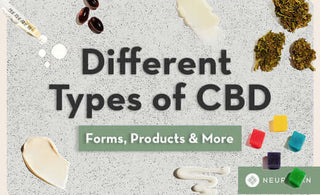Cannabidiol, better known as CBD, is regularly used for its well-being properties without the psychoactive effects typically associated with cannabis.
The three different extracts to choose from are: Full Spectrum, Broad Spectrum, and CBD isolate (Pure CBD).
As its popularity grows, you'll run into many types of CBD products. For first-timers, this sea of choice can feel overwhelming, which is why we've put together this guide to help you navigate the different types of hemp-derived CBD products.
What Are The Different Types of CBD?
When people ask about the different CBD types, they usually refer to hemp extract types, and there are three extract types to choose from:
- Full Spectrum
- Broad Spectrum
- CBD isolate (Pure CBD)
CBD is just one of the many active compounds found in the cannabis plant.
Depending on the extraction process, manufacturers can choose to incorporate the other cannabinoids, terpenes, and other beneficial components of the plant or isolate a compound completely.
Full Spectrum CBD: Complete Hemp Experience
Full Spectrum CBD is like capturing the essence of the entire cannabis plant in a bottle.
This type includes CBD and a wide array of cannabinoids, terpenes, flavonoids, and other compounds naturally present in the plant, including up to 0.3% THC (the federal legal limit) — but don't worry, most CBD oil made with full spectrum CBD will not contain enough THC produce psychoactive effects.
One of the most significant advantages of full spectrum CBD is the "entourage effect." This term refers to the synergistic interaction of these compounds, where their collective benefit is more significant than what each compound would offer individually.
This effect is thought to enhance the wellness properties of CBD, potentially making full spectrum products more effective for specific health goals.
Because of the compounding effects of the cannabinoids and terpenes, it also means that a little goes a long way when dosing a full spectrum CBD product compared to a CBD oil or gummy made from pure CBD alone.
CBD Isolate: Purest Form of CBD
CBD isolates represent the purest form of CBD available.
Through a rigorous extraction process, all other components of the cannabis plant are stripped away, leaving behind 99% pure CBD. This form is entirely devoid of THC, other cannabinoids, terpenes, and additional plant compounds.
The primary appeal of CBD isolates lies in their purity and the guarantee of no THC.
This is particularly important for individuals who may be subject to drug testing or have a sensitivity to THC, even in trace amounts.
Isolates are also a preferred choice for those who may be new to CBD and want to experience its effects without other compounds. An essential distinction in the effects of pure CBD versus the two different types is that you won't get the entourage effect with an isolate. It means that you may need higher doses of pure CBD isolate gummy or oil to achieve the same effects as the two other types of CBD extract.
Broad Spectrum CBD: Entourage Effect without THC
Broad Spectrum CBD strikes a balance between full spectrum and CBD isolate.
CBD products made with THC free broad spectrum extract still contain a wide range of cannabinoids and compounds, but with one significant exception — THC is completely removed.
This type of CBD is ideal for individuals who are sensitive to THC or wish to avoid it entirely due to personal preferences, workplace drug testing, or legal restrictions.
Despite the absence of THC, broad spectrum CBD oil still offers a reduced entourage effect. The various cannabinoids and compounds work together, providing a synergistic effect that can enhance the overall benefits of CBD.
What Are the Different Forms of CBD?
There are 5 forms of CBD, including CBD oil, creams, edibles, gummies & smokables.
CBD as an active ingredient stems from how CBD interacts with the human body, mainly through the endocannabinoid system (ECS), a complex network of receptors spread throughout the body. CBD's effectiveness in each form can be attributed to how it is absorbed and processed in the body's endocannabinoid system.
1. CBD Oils/ Tincture
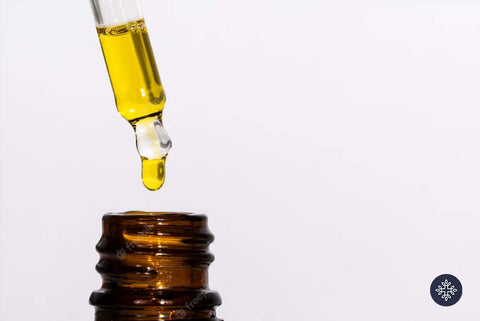
First up, we have CBD oil and CBD tincture, often called interchangeably by many, is the most popular CBD product offering as every brand has a version of their CBD oil, which at its essence is a type of CBD extract (broad spectrum full spectrum, or isolate CBD) combined with a carrier oil such as coconut oil, MCT oil, or hemp seed oil.
There are different types of CBD oil in terms of flavors and potencies, labeled in mg of CBD on the bottle, and it's designed to be taken sublingually (under the tongue) for fast-acting effects or can be added to food or beverages to add a wellness boost.
Pros:
- Versatility: Can be consumed sublingually, added to food, or used in drinks.
- Fast Absorption: The effects can be felt relatively quickly when taken sublingually.
- Concentration Control: Allows precise dosing, making adjusting easier based on individual needs.
Cons:
- Taste: Some people may find the natural flavor of CBD oil unappealing.
- Inconvenience: Carrying and measuring oil can be less convenient than other forms.
2. CBD Capsules
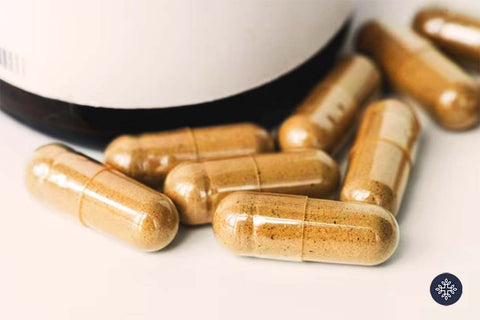
Essentially, capsules encapsulate CBD oil — full spectrum, broad spectrum, or isolate — in a gelatinous, often vegan-friendly casing. This form is prevalent among those who prefer the familiarity and simplicity of taking pills over other methods.
But you can also find pressed CBD pills in the form of mints. For those who prefer the most natural option, CBD capsules filled with dried whole hemp can be an option, too. Although, these won't have as potent CBD concentrations.
The best CBD capsules come with pre-measured doses, typically indicated in milligrams per capsule, making it effortless to keep track of your CBD intake. The encapsulation also masks any earthy taste of CBD oil, which is a significant plus for those sensitive to the flavor.
While they offer a discreet and convenient way to consume CBD, it's important to note that capsules go through the digestive system, which means the onset of their effects might take longer compared to sublingual oils.
However, this also often results in a more prolonged release of CBD into the system, which can be beneficial for sustained relief or effects over some time.
Pros:
- Convenience: Easy to take, especially for those used to taking supplements or medications in pill form.
- Discreet: Offers a discreet way to consume CBD without drawing attention.
- Pre-measured Doses: Simplifies dosing, as each capsule contains a set amount of CBD.
Cons:
- Delayed Onset: The effects may take longer to manifest compared to oils or smokables.
- Limited Dosage Flexibility: Adjusting the dose can be less precise than with oils.
- Digestive Process Impact: The body’s digestive process can affect the efficiency of CBD absorption.
3. Gummies and Edibles
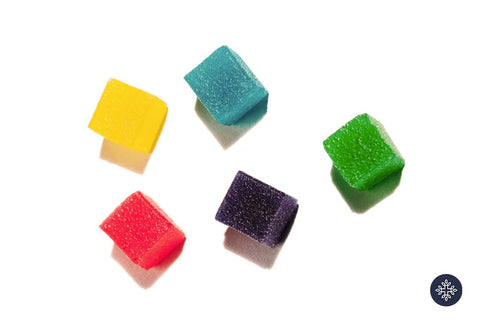
Moving on to a delightful segment in the CBD market, there are different types of CBD edibles, primarily gummies, which are rapidly gaining popularity for their ease of use and palatable appeal.
These products ingeniously incorporate CBD extract into various edible formats, from gummies to chocolates and beyond. Different CBD edibles may include other ingredients such as herbs and supplements for more targeted wellness goals, gummies for pain relief, sleep support, and more.
CBD gummies stand out for their flavor and as the market favorite, making them an ideal option for those who prefer a sweet way to consume CBD, especially those who don't love the natural taste of CBD oil.
Each edible is precisely dosed, usually indicated in milligrams per piece, allowing for easy and consistent monitoring of CBD intake. This feature is beneficial for beginners or those who prefer the certainty of knowing exactly how much CBD they are consuming with each serving.
Moreover, the allure of CBD edibles lies in their familiarity and the sheer variety of options available, catering to different taste and dietary preferences. For those following particular dietary preferences, there are also vegan options available, ensuring everyone can enjoy these wellness treats without compromising their standards.
However, it’s important to remember that, like capsules, edibles must pass through the digestive system. This process results in a delayed onset of effects compared to sublingual or inhaled methods, but the effects can last longer, providing a sustained CBD experience.
Pros:
- Taste and Variety: Often come in various flavors, making them more enjoyable to consume.
- Discreet and Convenient: Easy to consume without special preparation or equipment.
- Pre-measured Dosing: Each gummy or edible has a consistent amount of CBD.
Cons:
- Delayed Effects: The body needs to digest and metabolize them, which can delay the onset of effects.
- Sugar Content: Some gummies and edibles may contain sugar and other additives.
4. Topical CBD Products
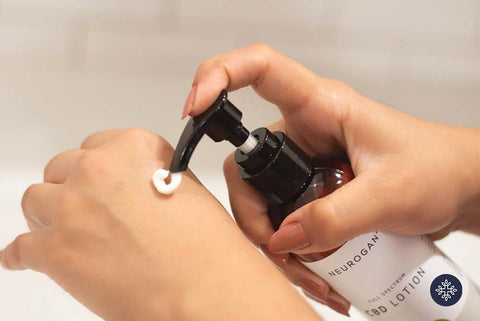
CBD topicals encompass a wide array of products, including creams, balms, lotions, and even salves, all infused with CBD — which incorporate full spectrum, broad spectrum, or isolate CBD. These products are designed for external application, offering a targeted approach to CBD's benefits.
The beauty of CBD topicals lies in their direct application to specific areas of the body. Topicals are particularly favored for localized relief and are commonly used for addressing muscle soreness, joint pain, or skin-specific issues like dryness or irritation.
The versatility of topicals extends to the skincare realm, where CBD's potential anti-inflammatory and antioxidant properties make it a sought-after ingredient in creams and serums for soothing and nurturing the skin.
Unlike ingestible forms of CBD, topicals provide the advantage of localized effect without systemic exposure, making them a suitable option for those who prefer not to ingest CBD or are looking for specific, localized outcomes.
CBD topicals stand out for their ease of use and the immediacy of their effects. They can be seamlessly incorporated into existing skincare routines or used as needed for discomfort. The absorption rate and effectiveness can vary based on the product’s formulation and the individual's skin type.
Pros:
- Targeted Relief: Ideal for localized issues like skin concerns or muscle aches.
- External Use: A good option for those who prefer not to ingest CBD.
- Variety: Available in various forms like creams, balms, and lotions to suit different preferences.
Cons:
- Skin Absorption Rate: May not be as effective for systemic concerns due to limited absorption through the skin.
- Dosage Uncertainty: Determining the amount of CBD used can be challenging.
- Frequent Application: May require regular reapplication to maintain effectiveness.
5. Smokable CBD Products

This category includes CBD-rich flower and vape products. This form of CBD offers a distinct experience, harking back to the age-old practice of smoking herbs.
CBD flower refers to the dried buds of hemp plants that are high in CBD and low in THC. These can be smoked in various ways, including through pipes, rolling papers, or specially designed vaporizers.
The appealing benefits of smoking CBD flower lie in its natural form, offering a pure and unadulterated way to enjoy the full spectrum of hemp’s compounds, including terpenes and minor cannabinoids, which contribute to the entourage effect.
Vaping CBD, on the other hand, involves inhaling vaporized CBD oil through a vape pen or vaporizer.
This method is preferred by those who seek a smoke-free alternative to traditional smoking. Vape pens offer a convenient, discreet, and portable way to consume CBD. Depending on the user's preference, they typically use cartridges filled with CBD extract, varying from full spectrum to isolates.
One of the primary advantages of CBD smokables is the rapid onset of effects. When inhaled, CBD is quickly absorbed into the bloodstream through the lungs, providing almost immediate results. This makes smokables an ideal choice for those seeking quick relief from symptoms like anxiety or acute pain.
It's worth mentioning the potential respiratory risks associated with smoking or vaping. While CBD itself is not harmful, the act of smoking or vaping can be, especially for individuals with respiratory issues.
Pros:
- Rapid Effects: Inhalation offers the fastest way for CBD to enter the bloodstream, providing quick relief.
- Experience: Smoking or vaping CBD can be a relaxing and enjoyable experience for some users.
- Dosage Control: Users can somewhat control the amount consumed through the number of puffs or the duration of inhalation.
Cons:
- Health Risks: Smoking or vaping can pose respiratory risks.
- Social and Legal Considerations: Smoking or vaping CBD may not be socially accepted in all settings and may face legal restrictions in certain areas.
- Shorter Duration of Effects: While the onset is rapid, the effects may not last as long as other forms.
How Do You Know Which CBD Type Works?
Finding the right CBD form & CBD product is often a matter of personal experimentation and research.
Start with small CBD doses and monitor how your body responds.
Consider your specific needs, such as the desired effects and any THC sensitivities, to guide your choice between full-spectrum, broad-spectrum, and isolate products.
Consulting with healthcare professionals can provide tailored advice, especially for those with existing health conditions or those on other medications.
Conclusion: Which Type of CBD Should You Buy?
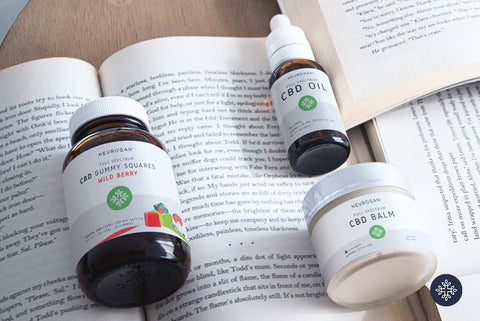
The decision on which type of CBD to buy depends on individual needs and preferences. Full spectrum products are ideal for those looking to benefit from the full range of hemp's compounds, while isolates are suitable for those needing or preferring to avoid THC.
Regardless of the choice, prioritizing quality, safety, and third-party verification is key to finding an effective and reliable CBD product that will fit seamlessly into your routine.
Glossary of Terms
| Term | Definition |
|---|---|
| CBD (Cannabidiol) | A natural compound found abundantly in the hemp plant, known for its potential wellness properties without psychoactive effects. |
| THC (Tetrahydrocannabinol) | The main psychoactive compound in marijuana that causes the high sensation, usually present in minimal amounts in full spectrum CBD products. |
| Full Spectrum CBD | A type of CBD extract that contains all compounds found in the cannabis plant, including trace amounts of THC (up to 0.3%). |
| Broad Spectrum CBD | Similar to full spectrum, but with all THC removed, offering a middle ground between full spectrum and isolates. |
| CBD Isolates | The purest form of CBD, containing only CBD without other cannabinoids or compounds from the cannabis plant. |
| Endocannabinoid System (ECS) | A complex biological system in the human body, composed of endocannabinoids, receptors, and enzymes, pivotal in maintaining homeostasis. |
| Entourage Effect | A theory suggesting that CBD works better when accompanied by other cannabis plant compounds compared to when it's used alone. |
| Certificate of Analysis (COA) | A document from a third-party laboratory that verifies the potency and purity of a CBD product, including its cannabinoid content and the presence of contaminants. |
| Phytocannabinoid | Naturally occurring cannabinoids found in the cannabis plant, including CBD. |
| Topicals | CBD-infused products, such as creams, balms, and lotions, applied directly to the skin for localized relief. |
| Sublingual Application | A method of consuming CBD oil by placing it under the tongue for quick absorption into the bloodstream. |
| First-Pass Effect | A phenomenon where the concentration of a substance, like CBD, is significantly reduced before it reaches the systemic circulation due to its metabolism in the liver and digestive tract. |
| Psychoactive Effects | Effects related to mind-altering properties, typically associated with THC and not CBD. |

